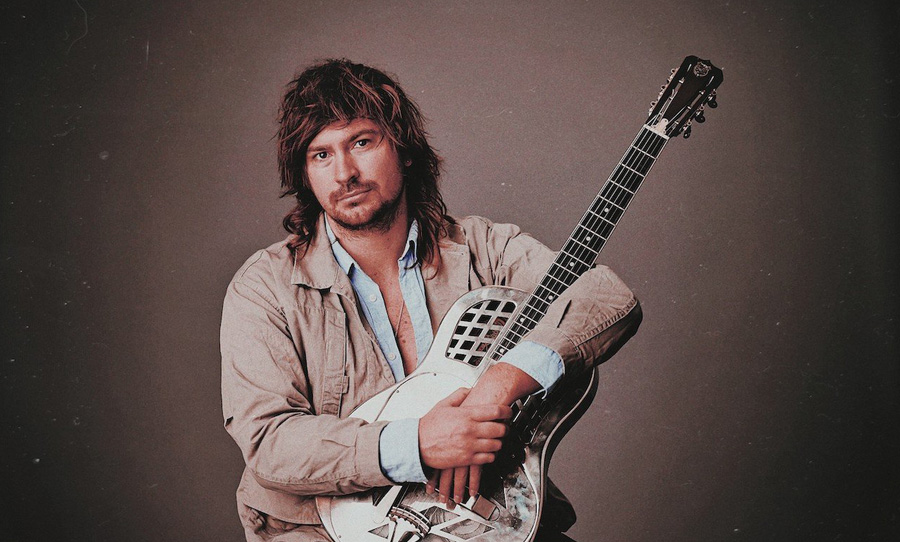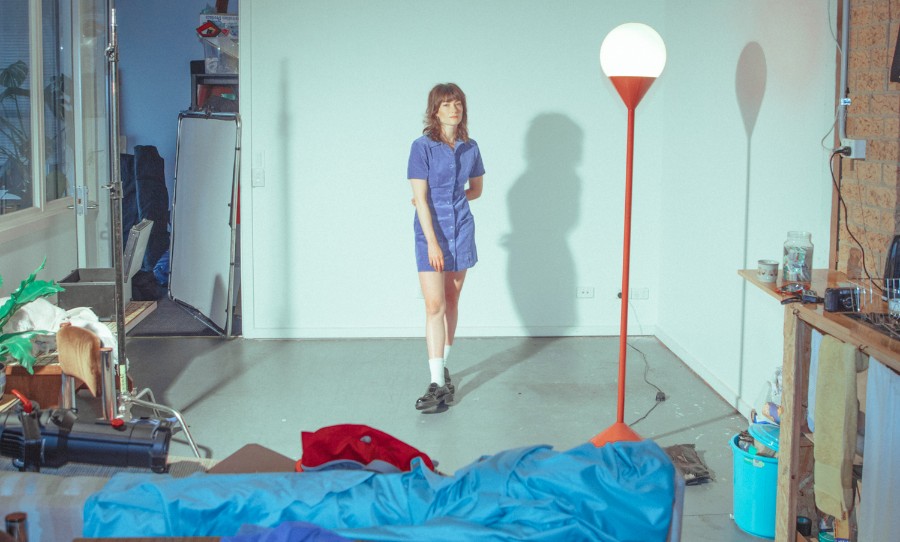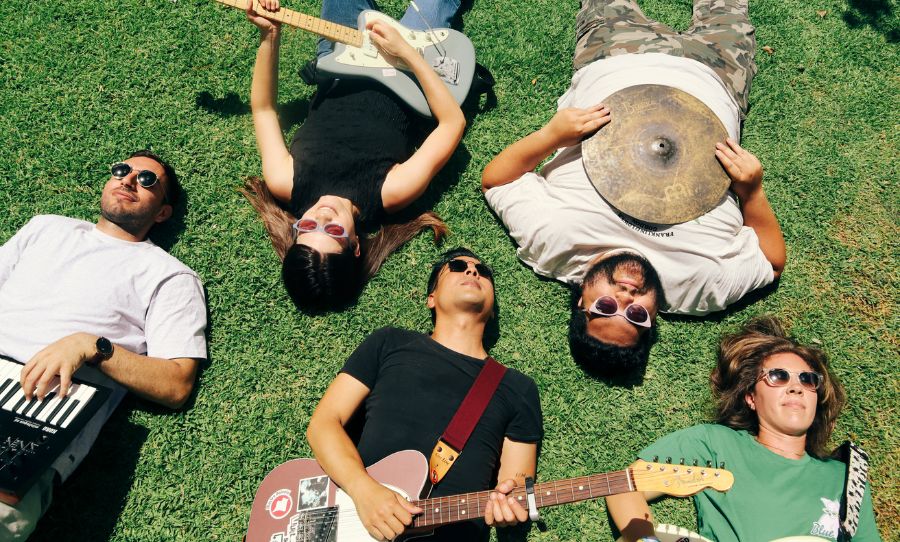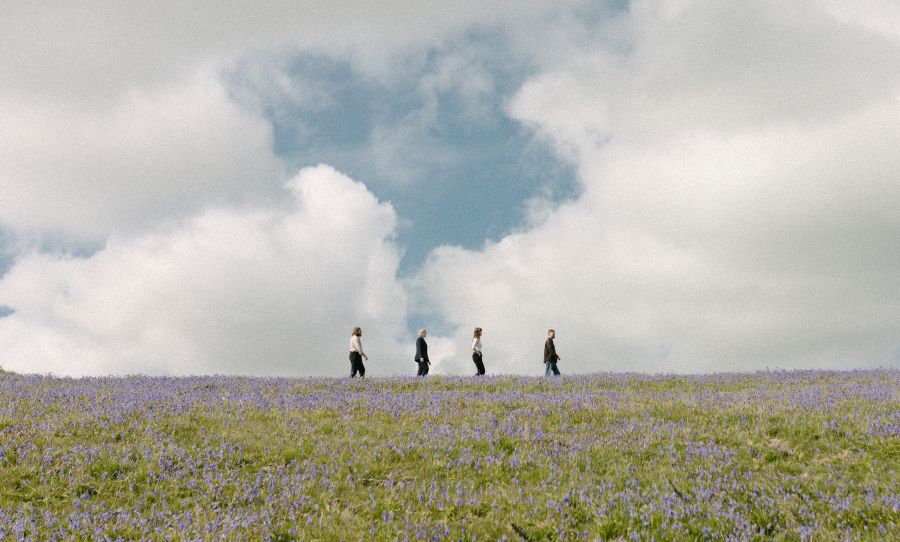When he’s not on Peking Duk duties, Reuben Styles is chasing inspiration with Y.O.G.A. Back with an expansive new EP, it’s clear that he’s only just getting started.
Y.O.G.A. (You’re Only Great Always) isn’t just a musical project, it’s a movement. The mastermind behind Y.O.G.A. is Reuben Styles, who is also one half of Peking Duk. And while we’re used to hearing heaving dancefloor bangers from Styles and his partner in crime, Adam Hyde, Y.O.G.A. is infinitely more personal to Styles, but simultaneously universal, on account of its message.
And about that message? Though Styles has definitely looked inward for lyrical inspiration, the overarching goal of Y.O.G.A. is to foster positive and constructive conversations around mental health. It’s woven into the musical and visual content of Y.O.G.A. (especially in the video for lead single Wolfer & The Dove — more on that later), and Styles’ action in parallel with the music — his team, Mullets for Mental Health, which is run by the Black Dog Institute, raises much-needed funds for mental health research.
When listening to You’re Only Great Always II — the second, lengthier EP for the project (the debut arrived in 2020) — it’s apparent that Styles is revelling in an atmosphere of experimentalism. Surrendering to the sounds of his adolescence, retro guitar pop, psychedelia, grunge, and a surprising amount of Spaghetti Western influences run deep through this collection of tracks.
On his way to collect some props (cowboy hats) for hotly anticipated DJ sets, we caught up with Reuben Styles while he was behind the wheel (hands-free, of course). We chatted about video production (both professional and DIY), his favourite toys in the studio, and the anxiety that comes with baring one’s soul.
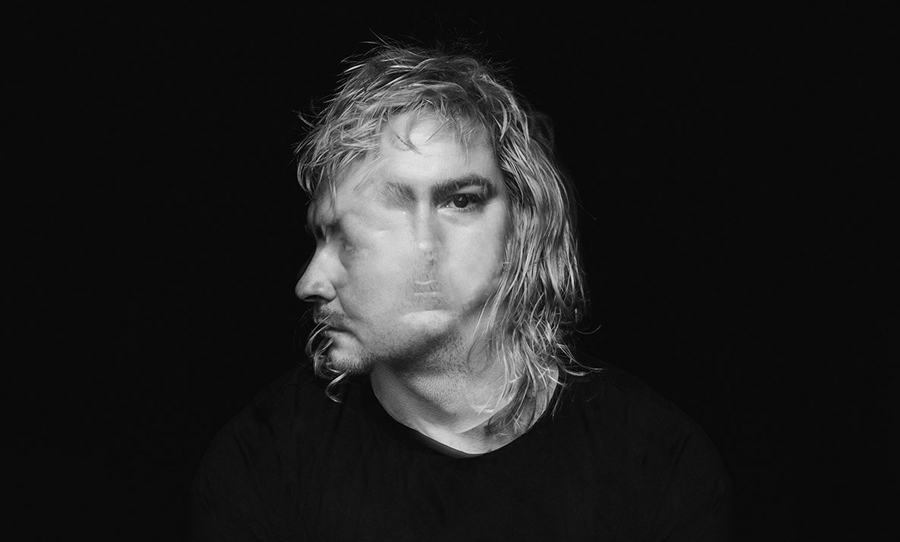
HAPPY: The Y.O.G.A. Project is obviously a massive sonic left turn from Peking Duk, and even quite different from the first Y.O.G.A. EP that came out last year. What motivated you to choose this palette of sounds for the second EP?
REUBEN: I think the palette of sounds just came together quite naturally. It’s kind of an elaboration on the first EP. Wolfer & The Dove is kind of like Your Devotion part two. And with the other four songs, there are parts that are quite psych-rock, parts that are indie, and then parts which are classic grunge, which kind of encapsulates that first EP. I think I just wanted to have more songs in this EP so I could go deeper down that rabbit hole of experimenting and finding where the project really does sit, musically.
HAPPY: There’s a lot of continuity throughout the tracks too. Lots of guitar, really psychedelic vocal treatments, and massive choral sounding pads of synths, and even field recordings that connect a couple of the songs. Were there any kind of specific toys that you were really vibing on in the production?
REUBEN: Yeah, I’m loving all the new Abbey Road plugins by Waves. Every single one is just so fun to just flick through the presets and just create those really front heavy vocal sounds. And with a lot of the tracks, you’ll hear I’ve stacked about, sometimes up to eight vocal layers.
HAPPY: It’s hard to tell sometimes because it sounds filtered but thick at the same time. I don’t exactly know what’s going on there…
REUBEN: Yeah. I’ve also been doing the classic old Beatles trick of running the vocals through a guitar amp.
HAPPY: Oh yeah?
REUBEN: And so after stacking eight layers that are almost identical, I’ll run them through the guitar amp so that it does get that filtered effect. It’s been so fun. And then also the classic [Roland] Space Echo, which has been just so, so fun to play with and get crazy vocal washes and echoes and dreamscapes. For the whole EP, I’d say the Space Echo would be the most used bit of hardware.
HAPPY: And was there any collaboration on the EP with other people, or was it strictly solo?
REUBEN: Peter Holz did the mixdown for everything, and I also did heaps of the recording in his studio as well. We’d go through and treat everything together. There’s a lot of Soundtoys going on there. I could put a Soundtoys plugin on literally every single track, and it’s just going to make everything sound sicker in some way or another. MicroShift is on everything.
HAPPY: You can definitely hear the phasing, that’s for sure. And was it all done in Sydney as well?
REUBEN: Yeah, it’s all done in Sydney at my studio in Leichardt, and also at Pete’s Studio, where we recorded all the vocals and all the drums. Our studios are in the same building, so it just made it so easy to just do my thing. And then when it was recording time, I’d go to his studio for the pro recording stuff like live drums.
HAPPY: Peking Duk is so collaborative in nature: you’re always tapping external vocalists to contribute to the big singles. Is it a massive change to record something that’s way more introspective? Especially when you’re stepping up to the mic yourself?
REUBEN: We love writing lyrics with all the Peking Duk songs, and we always have been a big fan of creating characters and just imagining ourselves in the boots of another character. I find it quite a lot easier, in general, to write in that in that setting, where you do put yourself in someone else’s shoes — perhaps a kid who’s just run away from home, or someone who’s just fallen in love for the first time, or something like that. That’s a cliché, but it’s genuinely a lot easier to write lyrics when you think of those like big, big crazy moments in a story or a movie. So, with this EP, instead of the lyrics taking a matter of hours, some lyrics have taken days.
HAPPY: That’s a massive workflow shift.
REUBEN: It’s so different! And when it came to doing lyrics for Ripple, The Boat I Left, or even See It In Your Eyes, and Pain Makes Us Alive, a whole lot of them are just things that I’ve slowly learned over the course of my life. I mean, The Boat I Left was kind of fun and easy for writing lyrics. I don’t reckon I spent more than a day on that — just because I put in so many metaphors, it was like, ‘Yeah, cool. That makes it fun and easy.’ But when it’s just true personal stories like Black Night Lullaby, it’s hard, and it’s making me so anxious thinking that this EP’s about to come out and all these personal insights are about to get out on the shelves.
And to put my own voice on something. That is truly terrifying stuff. I got to deal with the mass anxiety of my vocals being on something last year with the first EP. So, I’m starting to experience it again now, but nowhere near the same level as last time.
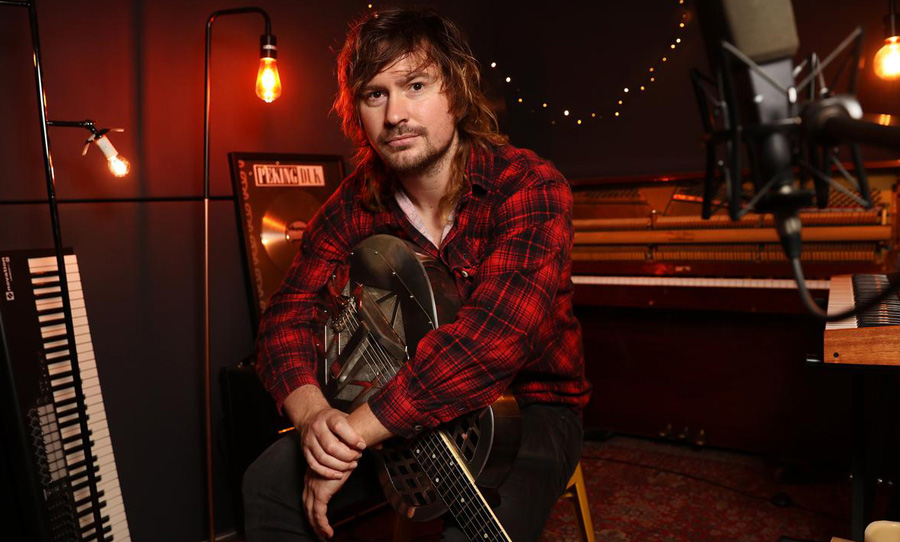
HAPPY: Songs like Ripple and See It In Your Eyes have a retro guitar pop feel, but it’s more off-kilter, with some really weird harmonies going on. Were there any influences that you were leaning on in particular for those tracks?
REUBEN: With Ripple, it just felt like a Strokes song — I always have been a big Strokes fan. With See It In Your Eyes, it felt like a lot of ’90s grunge songs all mixed together. You know, Marcy Playground versus Radiohead. And Ripple had those same grunge inspirations as well. But hilariously, I first wrote Ripple on ukulele then created synths, because I wrote it on the road. And the ukulele was really a great writing tool because mainly I didn’t know how to use it, so anything I’d do sounded different to what I’d done before. I had no patterns I could fall into or songwriting traditions that I could just follow. Everything was just randomised, so I saw it as like this magic song generator thing: you just pick it up for five minutes and you’ve got a new song that doesn’t make sense and no one’s ever heard. And that’s not a bad thing.
So I would then program it into synths on the computer. Each note I’d sound out one by one and go ‘ding, ding, ding’ and then start messing with a beat. I did that and then stripped out all the synths and replayed every synth with live guitars and then replayed all the beat with live drums from a great drummer, a good friend of mine, Tully Ryan. That song went through so many shifts and transformations. And I think once it got to a point of like, ‘OK, it was a ukulele’, it was then like a banging synthesizer song, now, it’s a guitar song. There comes a point where you know you’ve got to let the canvas breathe and not touch anymore. You just gotta go, ‘Alright, put down the paintbrush, put it out there and have fun.’
HAPPY: Such an interesting process.
REUBEN: It was. I love where it ended up. And it’s now just a really nice, mellow rock song, which sounds like everything I was listening to growing up and a lot of the things I’m still listening to right now.
HAPPY: The video for See It In Your Eyes, is very simple, but I found that quite moving as well. How did that come together?
REUBEN: Well, look: lockdown life. I had a sick video booked. I was going to shoot in the Snowy Mountains and we had, you know, horses and snow. Everything was planned and ready to go. And then the Sydney lockdown happened. And the film crew and the people helping out around Sydney were like, ‘Look, even if you get the permits and you everyone gets tested and we follow all the rules, it’s just not going to fly with all the locals that we’re working with, Sydney people.’
And it’s like, ‘Yeah, that’s fair enough. Don’t worry, we can do this next time there’s snow. There’ll be plenty more songs. We got this.’ But I did have to think of what to do for a clip, and I was like, ‘Shit, I don’t know what I’m going to do.’ And so I just thought, ‘Oh, I suppose I’ll just invest in whatever the latest iPhone is. It’s probably got a great camera.’ And then I got a gimbal, which stabilises the camera. And then I chucked on my rollerblades and just started rollerblading down the street. I thought I’d do around eight takes. I stopped after three takes and I was like, ‘I’m getting a beer. This is over.’
HAPPY: (Laughs).
REUBEN: I realised that after each take, I had to rollerblade all the way back to the starting point, and I’d be so far from where I started by the end each time and I was covered in sweat, so I’d have to get in my car, turn on the air-con. After the second take I was like, ‘If I don’t get it next take, I’ll just think of something else.’ In the next take, I reckon I messed up about probably five or six of the lyrics, because I was playing it all at double speed as well.
HAPPY: Yeah, so you could do the slo-mo.
REUBEN: Yeah. And my little boombox was sitting in my back pocket while I rollerbladed, so it wasn’t quite loud enough, so I fucked up the lyrics heaps. But after my third take, I’m like, ‘I’m not going to go to JB-Hifi to buy a louder boom box that barely fits’. Instead, I was like, ‘Yeah, I’m getting a beer’. I gave it a quick test. I chucked it in the splice app and halved the time and then synched the actual audio to it, with my blades still on, and I was like, ‘Yeah, this sounds all right.’ I mean, it’s still it’s cringy for me to watch. I think that’s because it’s me and I don’t like looking at myself. But, Emma, my partner, she was like, ‘No, it’s honestly fine.’
HAPPY: For the record, I thought it was great too. But the clip for the Wolfer & The Dove is obviously a much bigger production and has a sweeping narrative written into it. Can you shed some light on the message of that video and how it ties into the concept of the EP?
REUBEN: Wolfer & The Dove is a beautiful message. It’s about a bloke on a farm who really just wants to dress up in drag and come out amongst his peers, which I know is not an easy thing to do in regional Australia. I guess that video came about because Nicola, the lead actor, was dancing in drag at my wedding. There was this moment at the wedding where Nicola sang a song in Italian or lip-synched it in drag, then between songs started doing an outfit change whilst talking to the crowd and then did Man, I Feel Like a Woman, and absolutely stripping down to nothing on the top of the bar. It was so outrageous, so incredible, and so wild. And I was like, ‘This is the best thing I’ve ever seen in my damn life.’
I just knew straight away that I always wanted to do a video with Nicola after that, so I ended up calling Nicola and saying, ‘Hey, let’s do a music video. I’ve got a friend who’s a videographer in the Snowy Mountains. There’s probably somewhere cool.’ And so I hit it up Lucas, the director, who’s a videographer in the Snowy Mountains. He’s got this tree-planting charity that he created called Keep It Cool, and he’d been planting trees out at this farm. And so we went out to this farm and it was perfect! And George [the owner of the farm] runs his own mental health men’s group, where he reconnects farmers from all over the area, as farmers in that area have gone through a lot. They’ve gone through the drought, then the bushfires. And COVID. Oh my God, it’s just endless.
Being out on a farm, they’re quite isolated already, so to tell them they have to start getting groceries and booze delivered and further limiting their interactions, wasn’t great. So he started a men’s health mental health group called Around the Campfire. So between George, Lucas, and Nicola — who’s also a men’s mental health activist as well as a prominent member in the LGBT community — it was a great team to work with.
And everyone loves the movie Priscilla: Queen of the Desert. So we were like, ‘all right, let’s just do Priscilla part two’, and just create a character on a farm that just starts envisioning himself as herself frolicking around the farm. And that was the only brief we had. One day at the farm and we had that clip. It was beautiful.
HAPPY: And because Y.O.G.A. is a joint music and mental health awareness project, it could go forever, right? Are you planning to continue recording and take it to the stage?
REUBEN: Yeah, absolutely. I got to do a live show last year before the lockdown kicked in again. I got to play at the Lansdowne supporting Kwami, which was super fun. As for the debut headline show, I guess I’ll announce as soon as venues reopen, but as soon as possible.
HAPPY: Cool.
REUBEN: And yeah, the live show I’m just so excited for, but I’m also going to be doing DJ sets under the guise of COW TECH by Y.O.G.A. Yeah, it’s going to be a boot-scootin’ hoedown. I’ve got a COW TECH Triple J mix up on its way (which will air on Saturday, September 25), it’s going to be airing later this month, and I’ve pretty much just grabbed songs like Edge of Seventeen, Cat and Dog Theme Song, I’ve fully just remixed them and edited them and made him into heaving dance floor bangers. Dolly Parton to Ennio Morricone anthems, but with a kick drum and a sub! So there’s going to be full band live shows, but also there are going to be hilarious DJ sets where I’m going to just throw tons of cowboy hats into the crowd and just make it a clownish affair.
HAPPY: Can’t wait!
REUBEN: And in answer to the rest of the question, yes. The recorded project is only just at the beginning.
HAPPY: There’s so much scope for evolution because it’s such a big topic that we can explore forever. It’s a great thing that you’re doing for sure.
REUBEN: Fuck yeah, totally. Thank you.
To find out more about Mullets for Mental Health, visit the Black Dog Institute website.
You’re Only Great Always II is out now via Sony Music.
